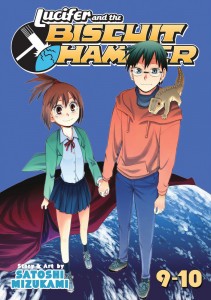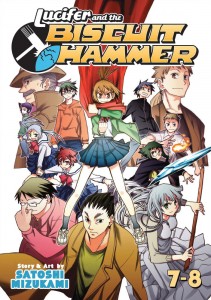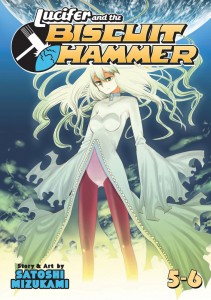By Satoshi Mizukami. Released in Japan by Shonen Gahosha, serialized in the magazine Young King Ours. Released in North America by Seven Seas.
This final volume has a lot of fighting and backstory in it – in fact, a good 4/5 of the book could be described as fighting and backstory, even the epilogue with Akane. But it’s a credit to the author that the backstory always feels natural and not like an infodump, and the fights never wear out their welcome, even when they’re supposed to. We get the villain’s main motivation (delusions of godhood), the relationship between him and Anima, and why Samidare is so desperate to smash the world. And, spoiler, the world is not smashed, which means that we also find out what happens afterwards – we hear in an afterword that Mizukammi always wanted to find out what happened to characters after the final battle ends, and that’s what we see here. It’s heartwarming as heck.
With the exception of Nagumo, our cast have for the most part been from middle-school to early college age, and their mindset and problems have stemmed from that – immaturity, frustration, pent-up emotions, and budding sexuality. We now see that Animus and Anima’s battle has remained what it is again due to a very childish reason – Animus has psychic powers, as does his sister, and when a doctor calls him a god, Animus gets one of the most creepy ‘insane grin’ faces I’ve seen in manga, and proceeds to prove his godhood by destroying first the space station they’re on, then the Earth. Anima, who was trying to convince him that powers or no he’s still a human, is desperate to stop him.
If this sounds vaguely familiar it’s because it’s mirrored in the relationship between Samidare and Yuuhi, who as I predicted is not really going to let her smash the world with her giant projected fist after all. That said, he does pretend he is for some time, which leads to a number of battles where he shows off how much he’s been holding back until now, and basically curbstomps all the other knights bar Mikazuki, who’s still down from the battle against Animus. Samidare goes on like a lovestruck girl (which she is) about how cool Yuuhi has become, and it’s true – his emotional growth in this series has been nothing short of stunning. And now with Samidare, who has discovered that she has something to live for after all, the emotional growth is a catharsis.
The 10 years in the future epilogue is a bit Harry Potter-esque, particularly the part where we find out that Shimaki and Yayoi got married despite very little interaction in the main series at all – Anima’s “Hmm?’ and blank stare reminds me of my own when I heard Luna was marrying some offscreen guy I’d never heard of. But as Yuuhi points out, that’s how life works, and is the nature of ‘where are they now?’ epilogues. More importantly, Samidare is healthy again, and everyone has been moving forward. Even Akane, in many respects the most emotionally broken of the group, gets a separate section to show off how much he’s changed – though the Hawaiian shirt is perhaps a bit much. (He also gets the best “love confession”.) The fighting is dine, our heroes are content, and so am I. This was a great ending to a terrific series, one of the more realistic takes on superhero battles out there. Get someone all of it for Christmas.



